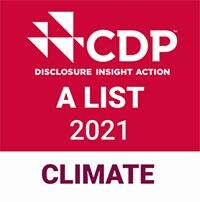Yamaha Group Recognized with Prestigious "A" Score for Climate Change by CDP
Yamaha Corporation (hereinafter referred to as "Yamaha") has been recognized for leadership in corporate sustainability by global environmental non-profit CDP*1, securing a place on its prestigious "A List" for tackling climate change.
This year's CDP Climate Change Survey was conducted on approximately 13,000 major companies around the world. The companies were evaluated on an eight-point scale from A to D-, with the highest honorable "A List" being awarded to 200 companies worldwide, including 55 companies in Japan.

Yamaha's Corporate Philosophy is "Sharing Passion & Performance," and we aim for sound and highly transparent management and corporate activities that are in harmony with the society and environment. In response to climate change, an urgent global issue, we have already obtained certification under the SBTi's 1.5°C target*2, and we are aiming to be carbon neutral by 2050. We have set ambitious targets to reduce Scope 1+2*3 greenhouse gas emissions by 55% and Scope 3*3 by 30% by the fiscal year ending March 2031 compared to the fiscal year ended March 2018. In addition, we will continue to steadily and continuously take actions toward decarbonization, such as conducting climate change scenario analysis and actively promoting the use of certified timber to enhance the sustainability of our forest resources.
Please see the following website to learn more about our efforts to mitigate and adapt to climate change.
[Climate Change Mitigation and Adaptation]
*1: CDP is a global non-profit organization that runs the world's environmental information disclosure system for companies, cities, states and regions. Founded in the UK in 2000 and working with more than 590 investors with over $110 trillion in assets, CDP pioneered using capital markets and corporate procurement to motivate companies to disclose their environmental impacts, and to reduce greenhouse gas emissions, safeguard water resources and protect forests. Over 14,000 organizations around the world disclosed data through CDP in 2021, including more than 13,000 companies worth over 64% of global market capitalization, and over 1,100 cities, states and regions. Fully TCFD aligned, CDP holds the largest environmental database in the world, and CDP scores are widely used to drive investment and procurement decisions towards a zero carbon, sustainable and resilient economy. For more information, please visit
*2: The Science Based Targets initiative (SBTi) promotes the setting of science-based greenhouse gas reduction targets and to evaluate and approve these targets aiming to achieve the Paris Agreement targets. SBTi was established in 2015 jointly by four organizations; Carbon Disclosure Project (CDP), an international NGO focused on the disclosure of environmental information; United Nations Global Compact; World Resources Institute (WRI); and World Wide Fund for Nature (WWF). The science-based reduction targets to limit global warming to 1.5°C above pre-industrial levels.
*3: Scope 1: Direct emissions from a company's own facilities from fuel combustion and other sources
Scope 2: Indirect emissions from purchases of energy (electricity, steam, etc.)
Scope 3: Indirect emissions other than Scope 1 and 2 (raw materials, parts procurement, transportation, product use, etc.) from a company's own value chain
